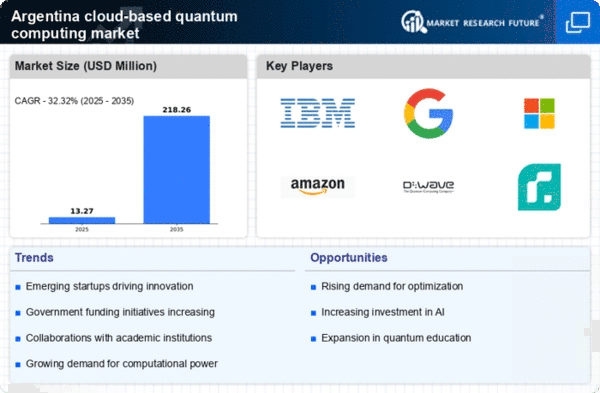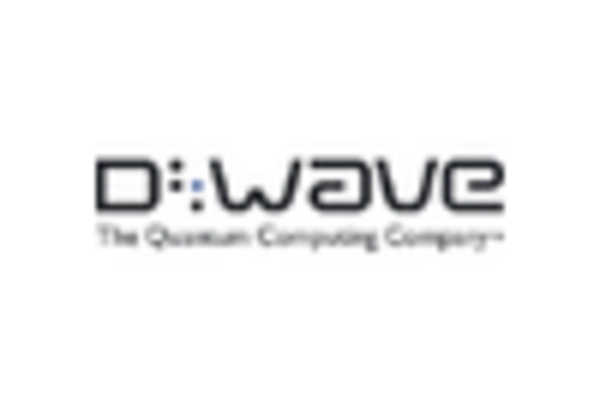Investment in Research and Development
Investment in research and development (R&D) is a critical driver for the cloud based-quantum-computing market in Argentina. The government and private sector are increasingly allocating funds to explore quantum technologies, aiming to enhance the country's technological capabilities. This focus on R&D is expected to yield breakthroughs that could position Argentina as a leader in quantum computing within the region. Recent reports indicate that R&D spending in the technology sector has increased by over 15% in the past year, with a notable portion directed towards quantum initiatives. Such investments not only stimulate the cloud based-quantum-computing market but also encourage collaboration between academic institutions and industry players, fostering a robust ecosystem for innovation.
Collaboration with International Tech Firms
Collaboration with international technology firms is emerging as a significant driver for the cloud based-quantum-computing market in Argentina. Partnerships between local companies and global leaders in quantum computing are facilitating knowledge transfer and access to advanced technologies. These collaborations often involve joint research projects, technology sharing, and co-development of quantum solutions tailored to local needs. Such alliances not only enhance the capabilities of Argentine firms but also position them to compete on a larger scale. As these partnerships grow, the cloud based-quantum-computing market is likely to benefit from increased innovation and the development of cutting-edge applications.
Regulatory Support and Framework Development
Regulatory support and framework development are crucial for the cloud based-quantum-computing market in Argentina. The government is actively working to establish a regulatory environment that fosters innovation while ensuring security and ethical considerations in quantum computing applications. This includes developing guidelines for data privacy, intellectual property rights, and the ethical use of quantum technologies. By creating a supportive regulatory framework, the government aims to attract investments and encourage the growth of the cloud based-quantum-computing market. As regulations evolve, they are expected to provide clarity and stability, which could further stimulate interest from both domestic and international stakeholders.
Rising Demand for Advanced Computing Solutions
The cloud-based quantum computing market in Argentina. is experiencing a surge in demand for advanced computing solutions. Industries such as finance, pharmaceuticals, and logistics are increasingly recognizing the potential of quantum computing to solve complex problems that traditional computing cannot efficiently address. This demand is driven by the need for faster data processing and enhanced analytical capabilities. According to recent estimates, the market for quantum computing in Argentina could reach approximately $500 million by 2027, reflecting a compound annual growth rate (CAGR) of around 25%. As businesses seek to leverage quantum technologies for competitive advantage, the cloud based-quantum-computing market is poised for significant growth, attracting investments and fostering innovation across various sectors.
Growing Interest from Startups and Entrepreneurs
The cloud based-quantum-computing market in Argentina is witnessing a growing interest from startups and entrepreneurs. This trend is characterized by the emergence of innovative companies focused on developing quantum applications and services. The entrepreneurial landscape is becoming increasingly vibrant, with numerous startups seeking to harness the power of quantum computing to address specific industry challenges. This influx of new players is likely to drive competition and accelerate advancements in the cloud based-quantum-computing market. Furthermore, the Argentine government has introduced various initiatives to support startups, including funding programs and incubators, which could further enhance the growth potential of this market segment.
















